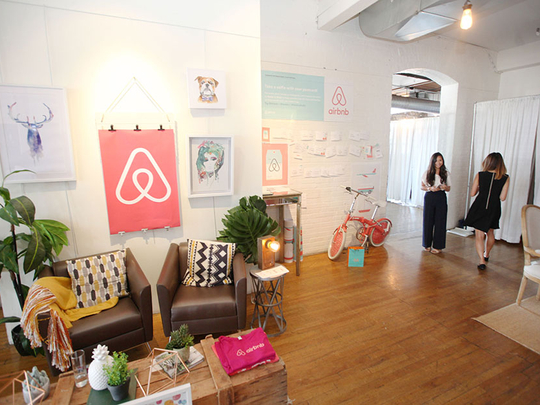
New York: Airbnb Inc. shares more than doubled in their trading debut, propelling the home-rental company to about a $100 billion valuation - and one of the biggest first-day rallies on record.
The shares closed Thursday at $144.71 up 113 per cent from the $68 initial public offering price. The listing came 10 months after the pandemic upended travel and 24 hours after DoorDash Inc. soared in its public debut.
Cash in the bank
Airbnb joined DoorDash in what is quickly becoming a euphoric moment for new listings in America's equity markets, egged on by retail investors embracing companies poised to thrive as vaccines promise a loosening of pandemic restrictions. While soaring valuations for IPOs give many market veterans pause, Airbnb is at least earning money, unlike 80 per cent of firms that have sold new shares in 2020.
The company just reported its most profitable quarter ever. "I don't know what else to say," Airbnb CEO Brian Chesky said, when indications showed the stock could open at more than $139 per share. "I'm very humbled by it."
Beats all from before
Airbnb's market value, based on its outstanding shares, makes it the world's biggest online travel company. Its $86.5 billion market value narrowly tops Booking Holdings Inc.'s $86.2 billion market capitalization, and eclipses Expedia Group Inc. and TripAdvisor Inc. Airbnb's market value, about 19 or 20 times its 2021 revenue at the opening price Thursday, also topped that of the four largest public hotel chains combined.
San Francisco-based Airbnb's fully diluted valuation is even higher, around $100 billion including employee stock options and restricted stock units.
Resilient enough
Alfred Lin, a Sequoia Capital partner who sits on the boards of both Airbnb and DoorDash, said the past two days have been a blur. Strong investor demand shows investors recognize Airbnb's potential, he said.
"We've seen how resilient this business model is and we've seen the company stare into the abyss of a pandemic that shut down global travel and figure their way out of it," Lin said.
DoorDash's debut surge - elevating its fully diluted value to about $71 billion - played a role in Airbnb's discussion about pricing its IPO above the marketed range.
To hang on to its lofty valuation, Airbnb will need to grapple with a litany of threats, as outlined in its IPO prospectus, ranging from a surge in party houses that carry liability risks to an increase in professionally run properties that lack the charm that made Airbnb rentals famous.
Boom's back
Airbnb and DoorDash propelled IPO volume to all-time high for December, surpassing the $8.3 billion mark set for the month in both 2001 and 2003, according to data compiled by Bloomberg.
There's more to come. Other consumer-facing web-based companies set to go public this month include video-game company Roblox Corp., installment loans provider Affirm Holdings Inc. and ContextLogic Inc., the parent of online discount retailer Wish Inc.
Those listings will add to what is already a record year for IPOs, with more than $167 billion raised on US exchanges, including Airbnb and DoorDash, the data show.
Airbnb's offering was led by Morgan Stanley and Goldman Sachs Group Inc. Its shares trade on the Nasdaq Global Select Market under the symbol ABNB.
In the third quarter, Airbnb's revenue declined only 18 per cent, compared to the near 60 per cent decline for Expedia and Marriott International Inc. The three-month period was also Airbnb's most profitable ever when adjusted for earnings before interest, taxes, depreciation and amortization.
For the first nine months of 2020, Airbnb had a net loss of $697 million on revenue of $2.5 billion, compared with a net loss of $323 million on revenue of $3.7 billion for the same period last year.
Reid Hoffman, of early Airbnb investor Greylock Partners, credited the company's leadership with steering the company through the pandemic. That included making difficult decisions to refund guests while providing partial payments to hosts, even though that had the painful consequence of laying off 25 per cent of its employees, he said.
"Today, Airbnb is thriving, and when effective vaccines are broadly available, it will no doubt adapt to those changed circumstances as well," Hoffman said.








